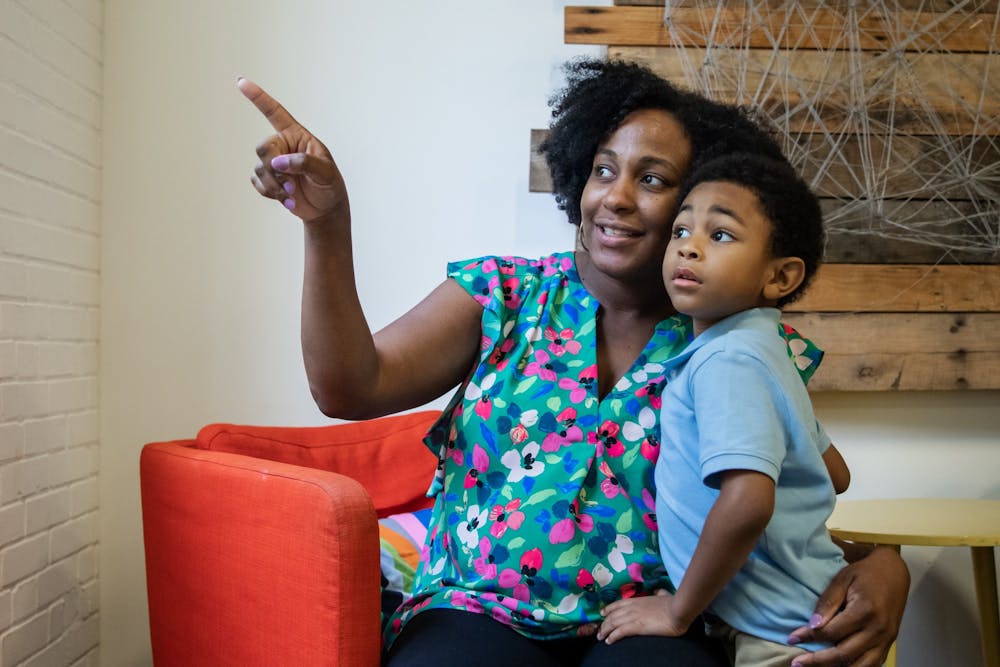MAAME is a nonprofit, community-based maternal health organization that serves Black, Indigenous, and people of color who give birth. They also support LGBTQ+ and low-income birthing people and their families in the Triangle.
Alongside this care, MAAME trains doulas to serve and educate the community about maternal health care.
Jackson said she personally decided to become a doula to help other families of color navigate the healthcare system in a way that would be culturally competent, trauma-informed and affirming.
MAAME works to combat the Black maternal health crisis, which exists because of institutional racism in the maternal care system, she said.
Maternal health inequity
Black women are three times more likely to die from a pregnancy-related cause than white women, according to the Centers for Disease Control and Prevention.
Racial disparities also persist in infant mortality rates. The Black infant mortality rate is 2.5 times that of white infants, according to a 2022 report from the North Carolina Child Fatality Task Force.
Furthermore, women of color are more likely to have symptoms that are dismissed by doctors, said Caitlin Williams, a doctoral candidate in the Department of Maternal and Child Health at UNC's Gillings School of Global Public Health.
They said this dismissal can happen regardless of socio-economic class and can cause near-fatal or even fatal birthing experiences.
Williams said there are a lot of ways to increase maternal health equity at both the state and federal levels – such as expanding Medicaid in North Carolina.
On the national scale, the Black Maternal Health Momnibus Act, introduced in 2021, would direct multi-agency efforts to improve maternal health, particularly among vulnerable populations.
Williams noted that they were one of the experts consulted for the bill.
To get the day's news and headlines in your inbox each morning, sign up for our email newsletters.
“We need to diversify our healthcare workforce to make sure that we've got people providing care who understand where their patients are coming from, like, in a real personal way, right?” she said.
Effects of Roe v. Wade
Williams, who studies how changes to policy affect access to healthcare, said that the overturning of Roe v. Wade will create greater maternal health inequity for low-income people and people of color.
Jackson described Roe v. Wade as “the BandAid on a wound that was already festering.”
Rebecca Kreitzer, an associate professor of public policy at UNC, said that despite abortion still being legal in the state, North Carolina is beginning to see ripple effects from Roe v. Wade's overturn. This includes an influx of out-of-state patients, she said, which can make scheduling appointments more difficult.
Jillian Riley, the N.C. director of public affairs for Planned Parenthood South Atlantic, said one-third of Planned Parenthood patients in North Carolina come from out of state.
Riley said she expects out-of-state patient numbers to rise as surrounding states continue to change their abortion restrictions.
Both Kreitzer and Williams said that while the end of the constitutionally-protected right to abortion does not currently have a legal effect on N.C., it may in the future.
According to N.C. state law, abortions are banned after 20 weeks except to save the life or health of the mother.
However, the 2016 case Bryant v. Woodall ruled that the ban was unconstitutional because the 20-week marker is several weeks prior to when a pregnancy would be considered medically viable. An injunction was granted in 2019 by the district court and prevents the state from enforcing its 20-week abortion ban.
On July 21, North Carolina Attorney General Josh Stein announced the North Carolina Department of Justice will not move to lift the injunction in Bryant v. Woodall.
“I don't know what constitutes a medical emergency or not,” Williams said, noting what healthcare providers might think when faced with a tough case. “How almost dead does somebody need to be before we're allowed to act? It's probably better for me just not to provide care after 20 weeks so that I don't get sued and maybe get my license removed.”
Kreitzer said cases after 20 weeks make up less than 1 percent of abortions and are usually performed because of extreme factors, such as fetal anomalies or risks to the mother’s health.
Alice Cartwright, a doctoral student in the Department of Maternal and Child Health at UNC, said that the full impact of the U.S. Supreme Court overturning Roe v. Wade on people who have miscarriages remains to be seen.
@msingleton42
@DTHCityState | city@dailytarheel.com




